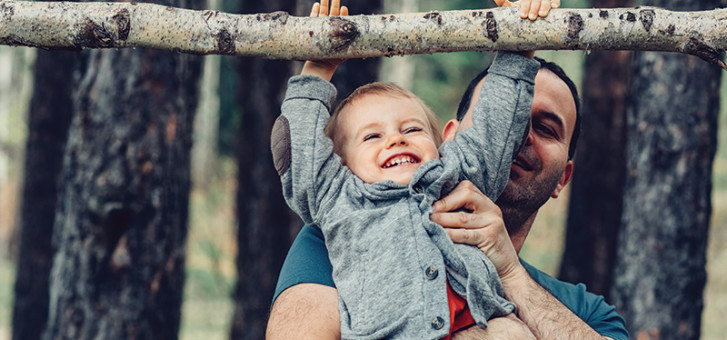I’ve been to this park many times. There are lovely tall mature trees, a large grassed area perfect for a lazy afternoon chatting with friends, flowers, and a rose garden. I even had my thirtieth birthday party here. But this time it was different.
Driving toward the park, the mid-morning sun was striking the yellow and red leaves of the deciduous trees, showcasing the wonderful late autumn colours of the season. But this wasn’t why it was different. Steering my car into a spot, I parked it, then glanced in the side mirror to check for traffic (safety first) before swinging the door open. I eased myself out and walked around the back of the car. Looking in the rear passenger window, I realised the difference: There was a baby in the back seat of my car!
I’m kidding. I knew he was there since I had put him in, and luckily he was still there, since I had been newly appointed his full-time carer (I don’t mean just for the morning or the day). You usually know this role as Mum, but here I am, Dad, out for the first time in the unfamiliar world of primary carers, making my way to the park with my son.
My world had already undergone a big change eight months prior when my wife gave birth to our first child. It’s incredible how something so small can take up so much of your time, energy and yet evoke so much love. We had saved and planned for our baby, and initially, my wife was a stay-at-home mum on unpaid maternity leave and I was working at my office job.
The problem was, my position was recently made redundant and as much fun as it would be for both of us to be stay-at-home parents, the bills have to get paid. After discussing what would be best for our family: Me looking for another job, likely having to commute and missing out on more precious time with our child, versus my wife going back to work a few minutes walk away, we decided she would go back to work full-time and I would look after our little bundle of joy. Not that he was that little by this stage. He was eight months old and weighed nine kilograms!
It was a slightly difficult step for me—not just the thought of looking after him—as I was giving up the traditional male role of breadwinner; men don’t look after babies! In fact, data from the Australian Institute of Family Studies show only 4 per cent of primary carers in two-parent families are men. Not only that, there was concern over what our choice would do to my career. As we hadn’t planned for a specific period that I would care for him, it felt like I was giving up my career to look after him forever. And even if it were for just two years or four (until he was ready for school), would I still have a career to go back to? I finally had an understanding of what mums go through when they give up their careers to care for their family.
Luckily for me, before my wife went back to work and I took over full-time care, we got to take a six-week family holiday (since annual leave limits didn’t apply to either of us). It was a nice handover period where I was made more aware of our son’s daytime routine. Before then, I knew the general theory of what happened from what my wife would tell me, but you miss out on a lot when in full-time work, being basically away almost the entire time your baby is awake.
(Back then, I was in charge of the last feed of the night and getting him ready for bed. While changing him, I would play with him, which I since learned was not a great idea, as it would rile him up and then he wouldn’t sleep—which, don’t tell my wife, was sometimes nice!)
"Children are not a distraction from more important work. They are the most important work."
It has been a few months now since my wife has gone back to work and we’ve been to the park I earlier described many times. I think I’m a little more confident now looking after our son than when I first started out.
There are a few different terms bandied about for those in my position: stay-at-home dad, house husband, Mr Mum and my personal favourite, daddy day care.
The funny thing about calling it day care is that you have to attend to your “client” overnight as well. This was one of my early concerns, as when I was working full-time, my wife would often get up during the night and I would sleep through, rarely hearing anything. How could I step up so that she could get a good night’s rest and be ready for work if I wasn’t even hearing him? As it turns out, after I became primary carer, my ears tuned in. Sometimes, my wife would even sleep through our son’s middle-of-the-night stirrings!
Also, the term stay-at-home dad (or mum) is a little erroneous as generally, you aren’t at home! Here’s a rundown of our week:
- Monday: Sing-along and storytime at the library, errands and grocery shopping
- Tuesday: Swimming lessons
- Wednesday: Playgroup
- Thursday: Currently free, but on the waiting list for a Chinese playgroup (since we are trying to raise our son bilingual)
- Friday: Meet up with other babies from the parent group we joined when our son was born, or a play in the park
Each activity doesn’t take the whole day, but with a child it always takes a long time to do anything. There’s feeding (oh the joy of solids!), changing his nappy, getting him dressed, changing his nappy again (invariably) and sometimes even his clothes again due to spew (although fortunately, that seems to have reduced).
Then there is all the extra stuff you have to pack: bottle and formula, hot water for the thermos, water bottle, snacks, food, nappy bag (with extra change of clothes for baby and yourself), pram and blanket.
At the car, it’s not just jump-in-and-go as it once was. You have to put the baby into the car seat, pull his arms through the straps, clip both sides of the buckle, tighten the straps, get his toy and get ready to do it all in reverse when you get to the destination, which often is only a few minutes away!
There’s also nap times, which you think would be easy, but sometimes it can take a while to get him to sleep. Either that or our little darling might only nap for 30 minutes, giving you barely enough time to sit down and rest for a few minutes before getting onto the next task, such as preparing for lunch or dinner. (I was the picture perfect 1950s housewife on my first week. I had meal plans and dinner was on the table when my wife got home, with the aroma of banana bread baking in the oven for dessert. That has lapsed a little now.)
I wasn’t expecting I would have a large excess of free time when I started, but I thought I would at least have a little. I even naively got out a computer game I thought I might be able to play! Turns out, there isn’t a lot of free time. On the plus side, a weekend newspaper lasts a whole week, unless you leave it within reach of the mobile paper shredder.
It’s not to say you don’t get any free time—he may play happily by himself for 10 minutes—but then he will be off getting into something he shouldn’t, stuck under something or needing attending to for some reason.
Early on, when he was on the floor in the living room playing with his toys, I had thought, Great, I’ll jump online and check my emails. It wasn’t long before he was crawling away and trying to get into something, probably the power cords (it’s always the power cords). I put on my firm voice and said, “No,” to no effect. So I got out of my chair, picked him up and told him, “Power cords are not for playing with,” and moved him back to his toys.
He started playing with the toys, I went back to the computer, but before I even had a chance to type a word, he was precariously pulling himself up the entertainment unit. I observed him for a few minutes, thinking about the email and formulating the reply I wanted to send, before gently pulling him down and enticing him back to his toys, jingling them to make them seem more interesting. I sat back at the computer, but before I could finish the first sentence, he started crying for no apparent reason.
I remember being so frustrated that I couldn’t get this email done—“Just give me a few minutes!” I grumbled in exasperation—but I soon learned my job wasn’t to check my emails; my job was to care for my son. (Later, I came across this quote that encapsulated my experience: “Children are not a distraction from more important work. They are the most important work.”)
And that’s the amazing thing: I have a son and I am a father, and it’s my job to look after him. It may not be the traditional way a father looks after their child, but it’s pretty good. Wonderful even. I’m thankful for the opportunity to see him crawling and pulling himself up onto things, and now I’m eagerly waiting for him to take his first step and to hear his babbling turn into coherent words.

How to change a dirty nappy
1. Sniff. Sometimes, it will be obvious as you can smell a dirty nappy from five metres away (proceed to step 3). Other times, even up close, it’s unclear if it’s dirty or not, so proceed to step 2.
2. Peek. If your baby is wearing trousers (not a onesie), you can prise open the back of the nappy to check. Warning: There will be times you will wish you didn’t do that as you would have just unlocked the seal with its contents right near your finger. It things aren’t obvious from this angle, assume nothing. Take trousers or onesie off and check under baby’s leg. Generally, definitive results can be obtained from this method. If a dirty nappy is established, proceed to step 3. Prep. I cannot emphasise this step enough. Before opening the nappy any further, get a wet wipe out, unfolded and ready, with a second one on standby. Just having the packet nearby won’t be sufficient when the nappy is opened and you’re trying to hold flailing legs up. It will be too late! Also, make sure a new clean nappy is within reach.
4. Distract. You might like to give baby a toy on the change table to keep his hands busy, as sometimes wandering hands can pull the dirty nappy away when you’re least expecting it. Note: You do run the risk of the toy being dropped where you really don’t want it to be.
5. Commit. Now that you are ready, take a deep breath (gas mask optional) and change the nappy. Easy!
Tip: If you reach your daily maximum poop threshold (after five dirty nappies in one day I had had enough!), feel free to complain on Facebook and fervently hope your partner will be home soon to change the next one.
On a serious note, sometimes you may see your baby really straining trying to poop, even crying in pain. It’s difficult to watch him suffer at that time. Often, you will also notice a hard nugget in his nappy. This is time to turn to “P” fruit: pears, plums, peaches, prunes and so on to get things moving.
You may also want to dial back the poop talk around your non-parent friends. They may begin to think that is all you ever talk about and might not hang around as much!






